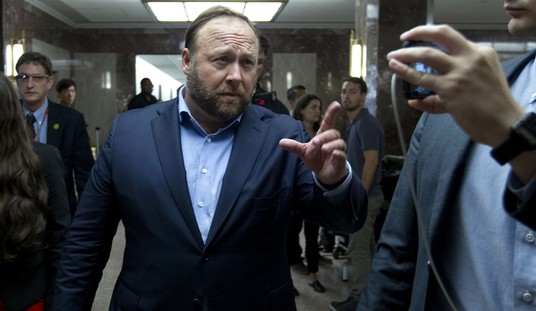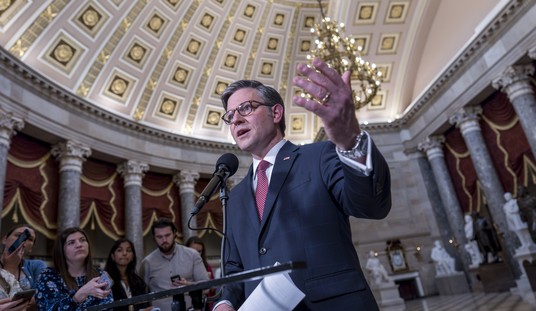Old and busted: ObamaCare is no “train wreck,” no matter what one of its authors says now. New hotness: Give us more money to head off this train wreck!
Senate Majority Leader Harry Reid (D-Nev.) says he shares colleagues’ concerns that the Affordable Care Act could become a “train wreck” if it’s not implemented properly.
Reid warned that people will not be able to choose health insurance plans on government health exchanges if federal authorities lack the resources to set them up and educate the public.
“Max said unless we implement this properly it’s going to be a train wreck and I agree with him,” Reid said, echoing a warning delivered last month by Senate Finance Committee Chairman Max Baucus (D-Mont.).
Reid warned the federal government is not spending enough money to implement the law because of Republican opposition to ObamaCare. “Here’s what we have now, we have the menu but we don’t have any way to get to the menu,” Reid said.
Well, the Senate has had three years to properly budget for the ObamaCare implementation. Did Reid and his Senate Budget Committee majority build enough spending into the last three budgets to cover that? Oh, wait — Reid and his Senate majority never bothered to produce a budget at all! So whose fault is it that Reid doesn’t have the cash now?
And also, didn’t ObamaCare have a whole trainload of taxes included in the bill? Remember, Democrats insisted that it would not create any deficit spending in the first decade, and that front-loading the taxes would provide the necessary lift for proper implementation. Now they’re claiming poverty as a reason the ACA is running off the rails.
By the way, Reid’s admission reveals that Barack Obama’s answer yesterday at the press conference on ObamaCare was entirely misinformed, no? That’s certainly my conclusion in my column for The Fiscal Times:
“For the 85 to 90 percent of Americans who already have health insurance,” Obama helpfully informed his audience, “they’re already experiencing most of the benefits of the Affordable Care Act — even if they don’t know it.” Insisting that the implementation has already been accomplished for the already-insured, Obama claimed, “Now they don’t have to worry about anything else.”
Nonsense, scoffed Washington Post fact checker Glenn Kessler. “There are a variety of studies and reports that suggest that, beyond those groups, some 10 million people face the prospect of losing their current health care,” Kessler said in rebuttal to the President’s remarks.
A University of Chicago study shows that nearly half of existing individual plans (as opposed to employer-provided group plans) will not qualify under Obamacare mandates for coverage. This means that these already-insured Americans will have to start shopping around again and spend more–25 percent more or even worse. In Oregon, one insurer is applying for a 53 percent increase in individual-plan premiums in order to bring their insurance into compliance with the ACA, including the pre-existing condition mandate. …
Besides, the people who really need to worry are those about to be thrown onto the individual market. Employers are looking for ways to reduce existing employees to part-time status in order to duck the mandate to provide subsidized group insurance. NPR reported this week on the business trend, which would save costs to the company but massively increase costs for Obamacare thanks to its system of subsidizing individual plan purchases through the ACA exchanges.
Investors Business Daily reached the same conclusion:
At his press conference this week, President Obama tried to reassure Americans about ObamaCare. Instead, he displayed either an incredible lack of understanding about his own law, or something far worse. …
But almost nothing he said in defense of ObamaCare was accurate. Among his statements:
“A huge chunk of it’s already been implemented.”
In fact, all that’s been implemented so far are a few PR-friendly changes like a mandate to cover children up to age 26 and a more generous Medicare drug benefit.
Democrats put off the bulk of the law — the massive market regulations, the government-run exchanges, mandates to buy coverage, and various taxes and fees—until 2014, both to hide its true costs and to avoid any unpleasantness before the 2012 elections.
If you want to see where the train wreck will take place, read Josh Kraushaar’s piece on how ObamaCare will likely become the Democratic Party’s Iraq War:
Support for the war dropped as officials struggled to implement nation-building after the fall of Saddam Hussein. As casualties piled up and the violence worsened, the fringe position of the liberal base gradually became more palatable. No longer were war-critiquing Democrats seen as soft on national security. In the 2006 midterms, Democrats effectively campaigned on an anti-war message to take back the majority in the House and Senate for the first time in 12 years, capitalizing on war weariness. Eventually a number of Republicans split from the party to save their political hide.
While the debate over Obama’s health care law isn’t a life-or-death battle, health care affects voter livelihood (and their voting decisions) like few other issues do. And there are clear signs that if premiums go up, businesses are forced to change how they insure their employees, and implementation of the law is uneven, the potential for political consequences are significant. In the 2010 midterms, Democrats suffered a historic landslide when the debate over health care was abstract. The stakes could be even higher when voters have first-hand experience with its effects. (Just look at the fevered reaction from Hill staffers affected by the law for a sampling of how intense voter anger could become.)
In both examples, the presidential sales pitch ended up being overhyped, with promises made that couldn’t realistically be achieved. At its heart, the mission to oust Saddam Hussein was about preventing a dangerous tyrant from using weapons of mass destruction – but administration officials advocated everything from democracy promotion to preventing an alliance between Iraq and al-Qaida as part of its overall argument. When events turned south, failure to achieve many of the items on the checklist proved politically embarrassing.
Obama’s health care law was designed to expand access to the uninsured. It’s a noble goal, if not necessarily a smart political priority. (It’s more popular to advocate for improved health care, not expanded access.) But to win support for the law, Obama claimed it would lower costs, improve the quality of care and not force anyone off their current health care plan. That’s not shaping up to be the case. Premiums are rising, employer uncertainty is growing and voters aren’t viewing the law favorably – with many not even aware of the frontloaded benefits already in place. And even on the access side, the law of unintended consequences is kicking in: Some large retail companies are cutting back employee hours so they won’t have to offer health insurance. That’s not good for the economy or health care access.
Democrats own this train wreck entirely — even if the top Democrat insists that the train is chugging along and all the passengers are happy travelers.








Join the conversation as a VIP Member